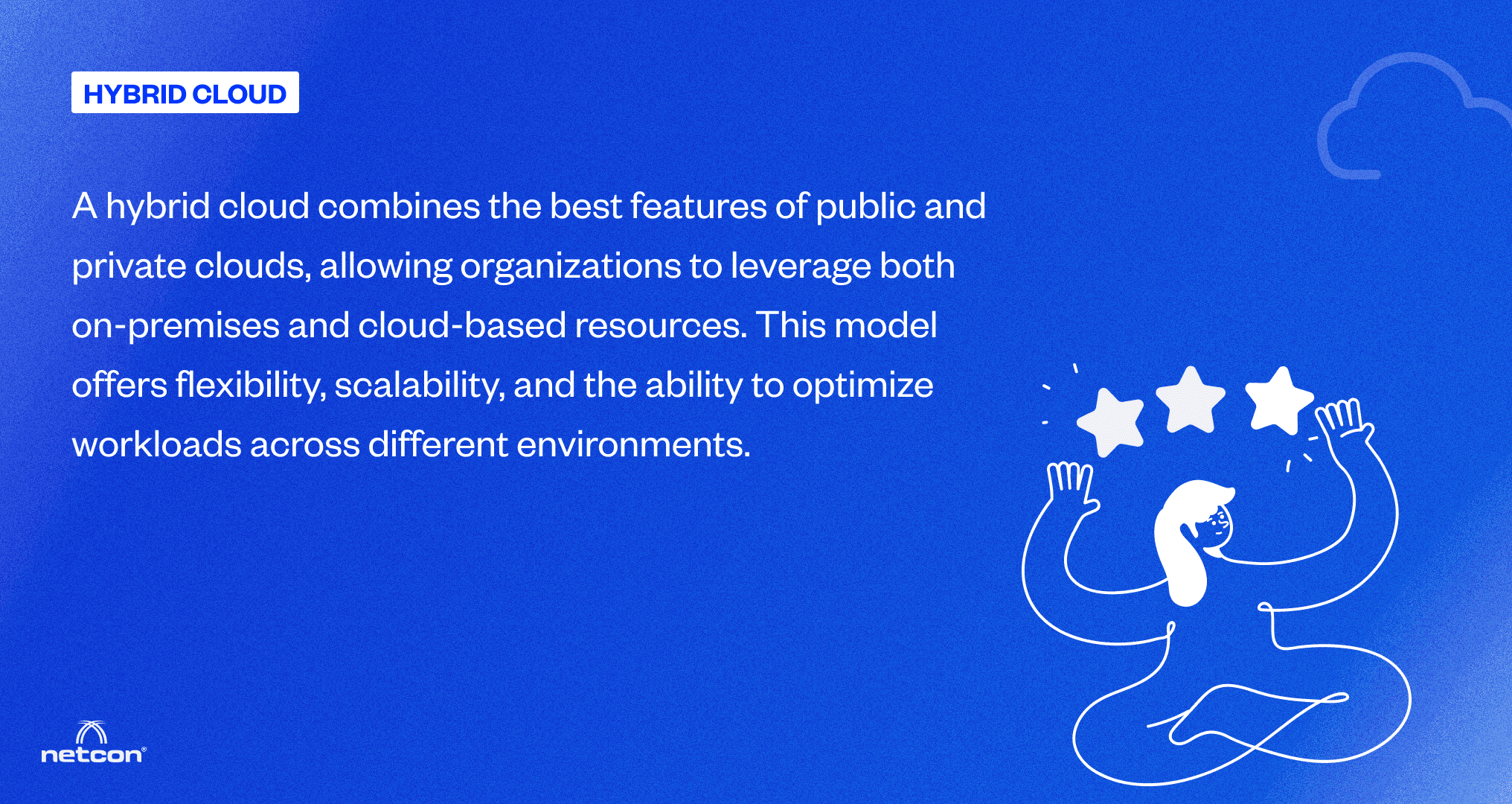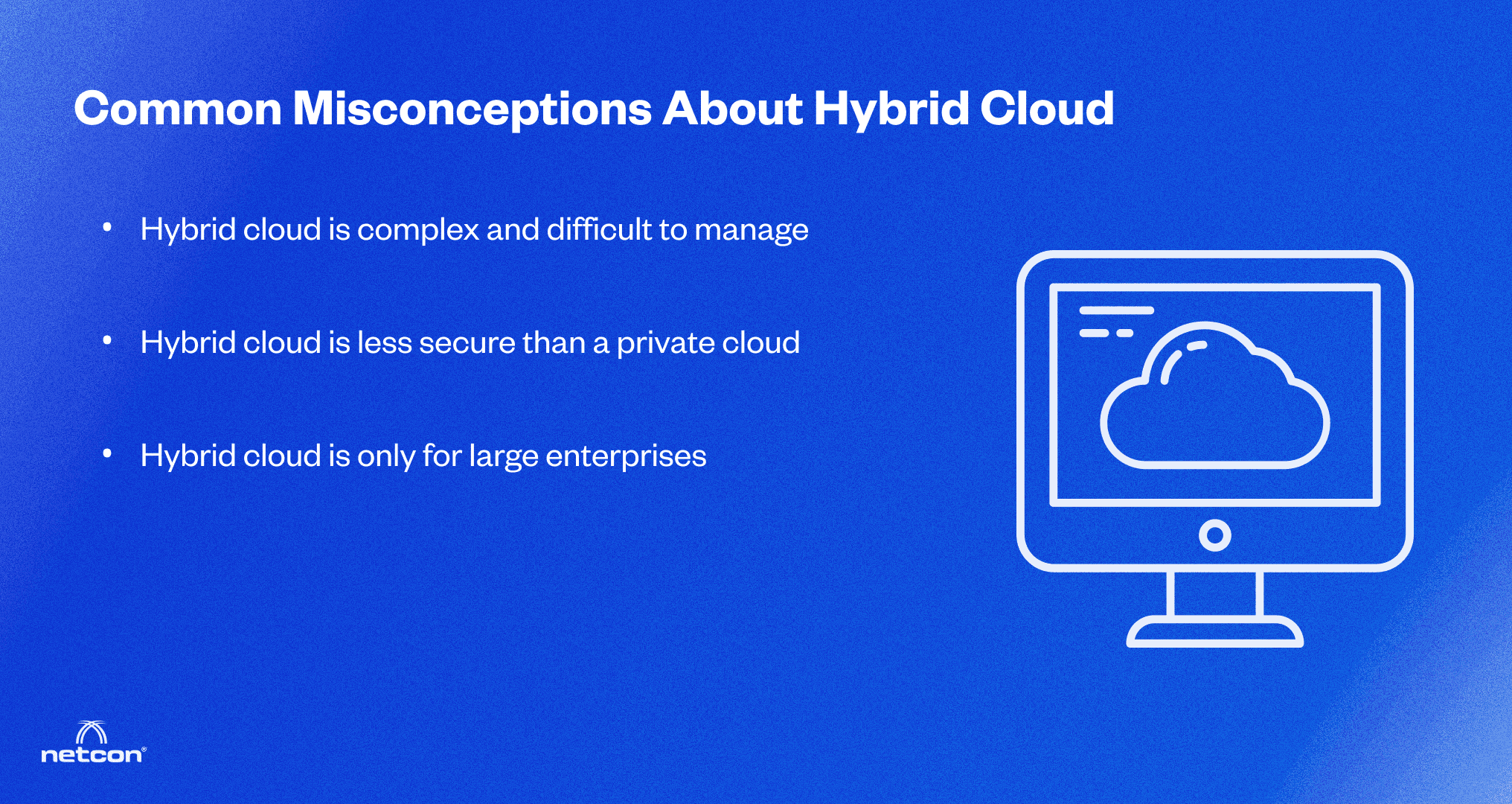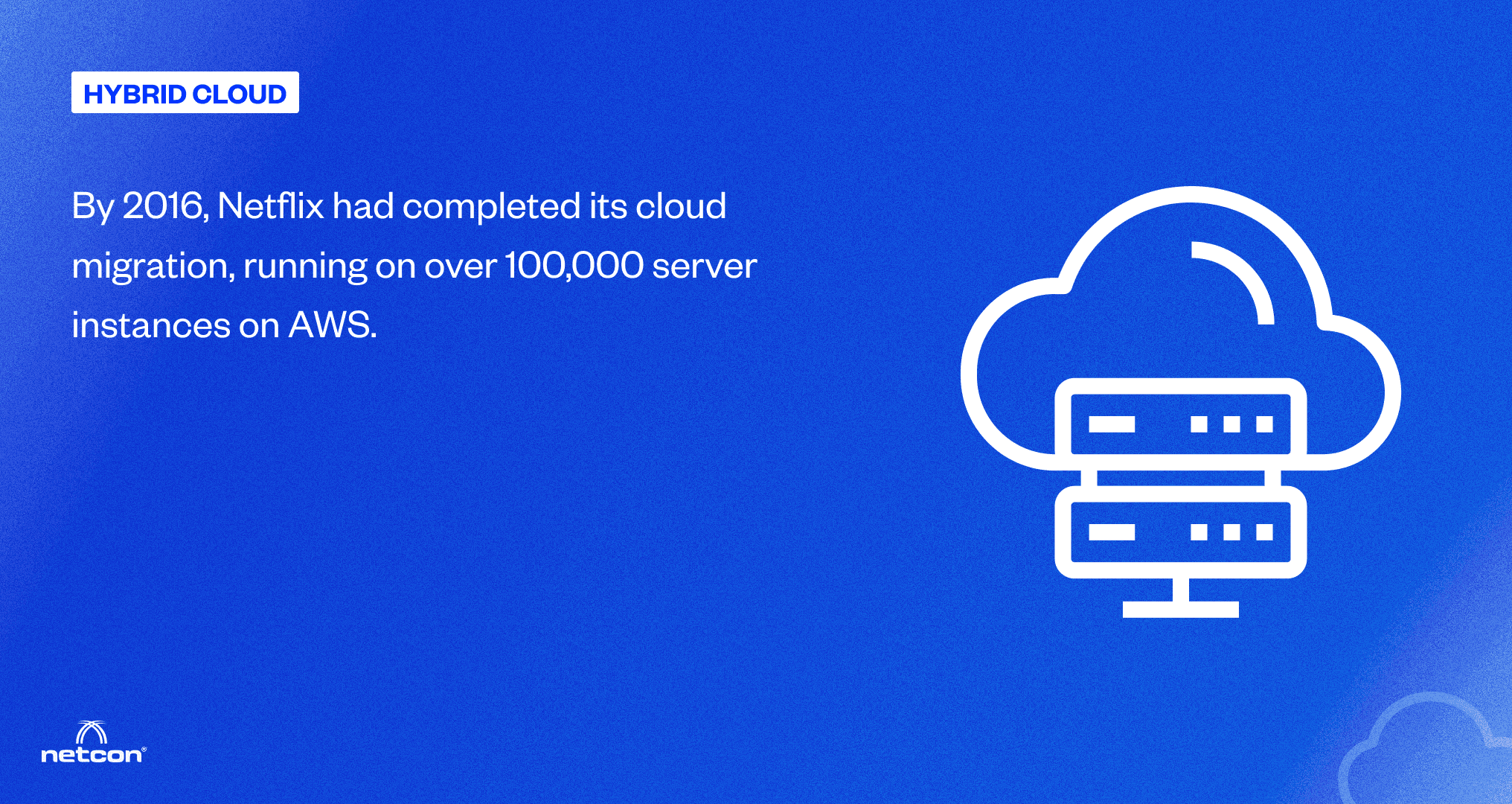industries
industries
Exploring Hybrid Cloud: A Comprehensive Introduction
By
Lakshmeesha P Kadasur
—
min read



Organizations constantly seek ways to enhance their IT infrastructure's flexibility, scalability, and cost-efficiency while maintaining control over mission-critical systems and data.
This is where the hybrid cloud model emerges as a game-changer, offering the best of both worlds – the robust security and control of private clouds combined with the limitless scalability and cost-effectiveness of public cloud services.
The hybrid cloud approach seamlessly integrates on-premises infrastructure with public cloud resources, enabling organizations to optimize their workloads across multiple environments based on their specific needs. Whether it's ensuring regulatory compliance, maintaining legacy systems, or handling fluctuating demand, hybrid cloud solutions provide the versatility to address a wide range of business requirements.
We've witnessed first-hand the transformative power of hybrid cloud solutions across diverse industries. Our expertise spans from enabling secure and compliant cloud adoption in the healthcare sector to empowering media and entertainment companies with on-demand scalability for resource-intensive workloads like video rendering and content processing.
With over 17 years of experience in managing complex IT infrastructures, we understand the challenges and considerations that come with adopting a hybrid cloud strategy. That's why we've developed a comprehensive framework to guide organizations through every stage of their hybrid cloud journey, from initial planning and design to implementation, integration, and ongoing management.
In this in-depth guide, we'll clarify the hybrid cloud model, exploring its real-world applications, benefits, and challenges. You'll gain valuable insights from case studies showcasing how industry leaders like Netflix and major financial institutions have leveraged hybrid cloud to drive innovation, enhance operational efficiency, and maintain a competitive edge.
Don't let legacy constraints or misconceptions hinder your organization's growth and agility. Unlock the full potential of hybrid cloud and chart your path to success by scheduling a consultation with our hybrid cloud experts today.
What is Hybrid Cloud?
As the name suggests, a hybrid cloud environment seamlessly integrates on-premises resources with public cloud services, allowing businesses to have the best of both worlds.
Hybrid Cloud in Cloud Computing: Basic Definitions
Before delving into the intricacies of hybrid cloud, it's essential to understand the fundamental cloud computing models. Cloud computing refers to the delivery of computing services, including servers, storage, databases, networking, software, analytics, and more, over the internet ("the cloud").
These services are offered by cloud providers and can be accessed on-demand, eliminating the need for organizations to maintain and manage their own physical infrastructure.
There are three primary cloud deployment models.
1. Public Cloud: In this model, cloud services are provided by third-party vendors, such as Amazon Web Services (AWS), Microsoft Azure, and Google Cloud Platform. These services are available over the public internet and are shared among multiple customers.
2. Private Cloud: A private cloud is a dedicated cloud environment operated solely for a single organization. It can be hosted on-premises or by a third-party service provider, offering greater control and security but often at a higher cost.
3. Hybrid Cloud: A hybrid cloud combines the best features of public and private clouds, allowing organizations to leverage both on-premises and cloud-based resources. This model offers flexibility, scalability, and the ability to optimize workloads across different environments.

How Hybrid Cloud Differs from Other Cloud Models
While public and private clouds offer distinct advantages, the hybrid cloud model is unique in its ability to bridge the gap between these two environments. Unlike a pure public or private cloud setup, a hybrid cloud allows organizations to distribute their workloads across multiple environments based on their specific needs.
For example, an organization may choose to host mission-critical or sensitive data on a private cloud for enhanced security and compliance, while having the scalability and cost-effectiveness of public cloud services for less critical applications or workloads with fluctuating demand.
This flexibility is valuable for organizations with legacy systems or regulatory requirements that prevent them from fully migrating to the public cloud. By adopting a hybrid cloud approach, they can gradually transition to the cloud while maintaining control over their existing on-premises infrastructure.
Up to speed with hybrid cloud but want to implement it? Here's guide for you to do so.
Common Misconceptions About Hybrid Cloud
Despite its growing popularity, there are several misconceptions surrounding the hybrid cloud model.
Hybrid cloud is complex and difficult to manage
While integrating multiple environments can introduce complexities, modern hybrid cloud solutions offer reliable management tools and automation capabilities to streamline operations and reduce the management overhead.
Hybrid cloud is less secure than a private cloud
With proper security measures and configurations, a well-designed hybrid cloud can offer the same level of security as a private cloud, or even surpass it, by utilizing the advanced security features offered by public cloud providers.
Hybrid cloud is only for large enterprises
While hybrid cloud solutions can certainly cater to the needs of large enterprises, they are also increasingly adopted by small and medium-sized businesses (SMBs) seeking scalability, cost-effectiveness, and flexibility.

By having clarity on these misconceptions, you can better understand and appreciate the true value and potential of the hybrid cloud model.
Real-World Applications of Hybrid Cloud
The hybrid cloud model has gained widespread adoption across various industries, giving organizations the benefits of both on-premises and cloud-based resources. From enhancing operational efficiency to driving innovation, the real-world applications of hybrid cloud are diverse and far-reaching.
Example Uses in Industries: Where is Hybrid Cloud Used?
Healthcare
In the healthcare industry, hybrid cloud solutions are invaluable for securely managing and processing sensitive patient data. Organizations can store and process protected health information (PHI) in a private cloud environment while leveraging public cloud services for non-critical applications, such as data analytics and patient portals.
Financial Services
Regulatory compliance and data security are paramount in the financial sector. Hybrid cloud allows banks and financial institutions to maintain control over sensitive data and mission-critical applications within their private cloud, while utilizing public cloud resources for customer-facing services, data processing, and analytics.
Manufacturing
Industrial organizations often have legacy systems and on-premises infrastructure that cannot be easily migrated to the cloud. By adopting a hybrid cloud approach, manufacturers can gradually transition to the cloud while maintaining their existing systems, enabling seamless integration and efficient resource allocation.
Retail
The retail industry relies heavily on scalable and flexible IT infrastructure to handle fluctuating demand during peak seasons. Hybrid cloud solutions enable retailers to leverage public cloud resources to scale up their e-commerce platforms and data processing capabilities during high-traffic periods, while maintaining core systems and sensitive data on their private cloud.
Media and Entertainment
Content creation, video rendering, and media processing require significant computing power and storage capacity. Hybrid cloud environments provide media and entertainment companies with the ability to burst to public cloud resources for resource-intensive workloads, while keeping sensitive data and intellectual property secured within their private cloud.
These are just a few examples of how various industries are leveraging the power of hybrid cloud to address their unique challenges and requirements.
Case Studies: Netflix and AWS as Hybrid Cloud Examples
One of the most notable examples of successful hybrid cloud implementation is Netflix's use of Amazon Web Services (AWS). Initially, Netflix ran its entire infrastructure on-premises, but as the company grew rapidly, it became increasingly challenging to scale and maintain their data centers.
To address this challenge, Netflix adopted a hybrid cloud approach, leveraging AWS for its streaming services and content delivery network (CDN), while retaining its billing and customer data systems on-premises. This hybrid model allowed Netflix to scale its streaming capabilities on-demand, reducing the need for expensive hardware upgrades and ensuring a seamless viewing experience for its millions of subscribers worldwide.
By 2016, Netflix had completed its cloud migration, running on over 100,000 server instances on AWS.

Another interesting case study is that of a major financial institution that implemented a hybrid cloud solution to comply with regulatory requirements while optimizing resource utilization. The institution hosted its core banking applications and sensitive data on a private cloud, ensuring security and compliance. At the same time, they leveraged public cloud services for non-critical workloads, such as customer-facing applications, data analytics, and development environments.
By adopting a hybrid cloud approach, the financial institution achieved cost savings, improved scalability, and enhanced agility while maintaining strict control over sensitive data and mission-critical systems.
These real-world examples demonstrate the versatility and power of hybrid cloud solutions, enabling organizations across various industries to optimize their IT infrastructure, enhance operational efficiency, and drive innovation while addressing their unique challenges and requirements.
Benefits and Challenges of Hybrid Cloud
As with any technology solution, hybrid cloud presents a set of challenges that you must carefully consider and address. Let’s explore the major benefits of adopting a hybrid cloud strategy and delve into the key challenges and considerations organizations should keep in mind.
Major Benefits of Using Hybrid Cloud
Flexibility and Scalability
One of the primary advantages of hybrid cloud is its ability to provide flexibility and scalability on demand.
Organizations can use public cloud resources to seamlessly scale up or down based on their evolving business needs, without being constrained by the limitations of their on-premises infrastructure. This agility enables them to respond quickly to market demands, handle sudden traffic spikes, and optimize resource utilization.
Cost Optimization
By combining on-premises and cloud resources, hybrid cloud solutions allow organizations to optimize their IT costs. They can keep mission-critical and resource-intensive workloads on-premises while offloading less critical or fluctuating workloads to the public cloud, taking advantage of its pay-as-you-go pricing model.
This approach helps organizations avoid over-provisioning resources and ensures they only pay for what they use.
Data Sovereignty and Compliance
Certain industries and regions have strict data sovereignty and compliance regulations that mandate data storage and processing within specific geographical boundaries.
Hybrid cloud solutions enable organizations to maintain sensitive data and workloads within their private cloud or on-premises infrastructure, while leveraging public cloud resources for non-sensitive workloads, ensuring adherence to regulatory requirements.
Business Continuity and Disaster Recovery
By distributing workloads across multiple environments, hybrid cloud solutions can enhance business continuity and disaster recovery capabilities. If one environment experiences an outage or disruption, critical workloads can be a failover to the other environment, minimizing downtime and ensuring continuous operations.
Legacy System Integration
Many organizations have legacy systems and applications that are not easily migrated to the cloud. Hybrid cloud solutions allow these organizations to maintain their existing on-premises infrastructure while integrating it with cloud-based services and resources, enabling a gradual and controlled transition to the cloud without disrupting business operations.
Innovation and Agility
The hybrid cloud enables organizations to quickly spin up development and testing environments in the public cloud, accelerating time-to-market for new products and services, while keeping their production workloads secure and stable on-premises or in a private cloud.
Challenges and Considerations in Adopting Hybrid Cloud
We looked at the benefits of the hybrid cloud. But you must also be aware of the challenges and considerations associated with its adoption and management.
Complexity and Management Overhead
Integrating and managing multiple environments with different architectures, configurations, and management tools can introduce significant complexity. Organizations need to ensure they have the necessary skills and resources to effectively manage and maintain their hybrid cloud infrastructure, including monitoring, security, and governance across environments.
A managed service provider like Netcon can help with this complexity of hybrid cloud.
Data Movement and Integration
Moving data between on-premises and cloud environments can be challenging, especially when dealing with large volumes of data or strict compliance requirements. Organizations must carefully plan and implement secure and efficient data transfer mechanisms, ensuring data integrity and minimizing latency.
Security and Compliance
While hybrid cloud solutions can enhance security and compliance capabilities, they also introduce new security challenges. Organizations must implement robust security measures, such as encryption, access controls, and network segmentation, to protect data and workloads across environments. Additionally, they must ensure compliance with relevant industry regulations and data protection laws.
Vendor Lock-in and Portability
Adopting a hybrid cloud solution can potentially lead to vendor lock-in, making it difficult to migrate workloads between different cloud providers or on-premises environments. Organizations should carefully evaluate their vendor selection and implement strategies to ensure portability and avoid vendor lock-in, such as adhering to industry standards and leveraging containerization and orchestration technologies.
Cost Management and Optimization
While hybrid cloud solutions can optimize costs, managing and forecasting costs across multiple environments can be challenging. Organizations must implement effective cost monitoring, reporting, and optimization strategies to ensure they are maximizing the cost benefits of their hybrid cloud deployment.
Cultural and Organizational Change
Adopting a hybrid cloud strategy often requires significant cultural and organizational changes within an organization. IT teams must acquire new skills and adapt to new processes and workflows, while business stakeholders need to understand and embrace the benefits and challenges of a hybrid cloud model.
Looking to master the hybrid cloud model? Our blog will help you.
How Netcon Technologies Can Help
Navigating the complexities of hybrid cloud can be a daunting task, but you don't have to go it alone. At Netcon, our team of cloud experts is dedicated to helping organizations like yours understand and leverage the power of hybrid cloud solutions.
With our in-depth knowledge and experience, we can guide you through the fundamentals of hybrid cloud computing, dispelling common misconceptions and providing real-world examples of its applications across various industries. Our consultants will work closely with you to assess your unique requirements, identify potential benefits, and address any challenges you may face in adopting a hybrid cloud strategy.
At Netcon, we pride ourselves on delivering personalized solutions tailored to your specific needs. Whether you're just starting to explore hybrid cloud or seeking to enhance your existing cloud infrastructure, our comprehensive services have got you covered.
Don't let the intricacies of hybrid cloud hold you back. Unlock its full potential with Netcon as your trusted partner. Reach out to us today to schedule a consultation and take the first step towards a seamless hybrid cloud journey.
Written by
Lakshmeesha P Kadasur
Chief Delivery Officer
Lakki, a global modernizer for 28 years, propels digital migrations. As an automation ace and revered infrastructure sensei, he spearheads our managed services ascent, optimizing, innovating, and bending space-time with cloud initiatives. Lakki's collaborative leadership manifests new realities, guiding executives beyond virtualized mobility and mainframe milestones. With allegiances to revolutionaries like IBM, Wipro, and CTS, his transitional vision elevates companies worldwide.

BLOGS
Data Center

Mastering Data Center Management with Expert Consulting
Aug 14, 2024
—
13 min read
Data Center

Engaging with Data Center Consultants for Optimal Solutions
Aug 14, 2024
—
12 min read
Data Center

Introduction to Data Center Certifications: An Overview
Aug 14, 2024
—
14 min read
Data Center

Mastering Data Center Operations with Advanced Certifications
Aug 14, 2024
—
12 min read
Ready to take your company to the next level?
Unlock your business potential with us
Ready to take your company to the next level?
Unlock your business potential with us
Ready to take your company to the next level?
Unlock your business potential with us
Ready to take your company to the next level?
Unlock your business potential with us

© Copyright 2024 Netcon Technologies. All rights reserved. All logos and trademarks used belong to their respective owners.

© Copyright 2024 Netcon Technologies. All rights reserved. All logos and trademarks used belong to their respective owners.

© Copyright 2024 Netcon Technologies. All rights reserved. All logos and trademarks used belong to their respective owners.

© Copyright 2024 Netcon Technologies. All rights reserved. All logos and trademarks used belong to their respective owners.
Ready to take your company to the next level?
Unlock your business potential with us

© Copyright 2024 Netcon Technologies. All rights reserved. All logos and trademarks used belong to their respective owners.
BLOG
Exploring Hybrid Cloud: A Comprehensive Introduction
BY
Lakshmeesha P Kadasur
—
12
min read


Organizations constantly seek ways to enhance their IT infrastructure's flexibility, scalability, and cost-efficiency while maintaining control over mission-critical systems and data.
This is where the hybrid cloud model emerges as a game-changer, offering the best of both worlds – the robust security and control of private clouds combined with the limitless scalability and cost-effectiveness of public cloud services.
The hybrid cloud approach seamlessly integrates on-premises infrastructure with public cloud resources, enabling organizations to optimize their workloads across multiple environments based on their specific needs. Whether it's ensuring regulatory compliance, maintaining legacy systems, or handling fluctuating demand, hybrid cloud solutions provide the versatility to address a wide range of business requirements.
We've witnessed first-hand the transformative power of hybrid cloud solutions across diverse industries. Our expertise spans from enabling secure and compliant cloud adoption in the healthcare sector to empowering media and entertainment companies with on-demand scalability for resource-intensive workloads like video rendering and content processing.
With over 17 years of experience in managing complex IT infrastructures, we understand the challenges and considerations that come with adopting a hybrid cloud strategy. That's why we've developed a comprehensive framework to guide organizations through every stage of their hybrid cloud journey, from initial planning and design to implementation, integration, and ongoing management.
In this in-depth guide, we'll clarify the hybrid cloud model, exploring its real-world applications, benefits, and challenges. You'll gain valuable insights from case studies showcasing how industry leaders like Netflix and major financial institutions have leveraged hybrid cloud to drive innovation, enhance operational efficiency, and maintain a competitive edge.
Don't let legacy constraints or misconceptions hinder your organization's growth and agility. Unlock the full potential of hybrid cloud and chart your path to success by scheduling a consultation with our hybrid cloud experts today.
What is Hybrid Cloud?
As the name suggests, a hybrid cloud environment seamlessly integrates on-premises resources with public cloud services, allowing businesses to have the best of both worlds.
Hybrid Cloud in Cloud Computing: Basic Definitions
Before delving into the intricacies of hybrid cloud, it's essential to understand the fundamental cloud computing models. Cloud computing refers to the delivery of computing services, including servers, storage, databases, networking, software, analytics, and more, over the internet ("the cloud").
These services are offered by cloud providers and can be accessed on-demand, eliminating the need for organizations to maintain and manage their own physical infrastructure.
There are three primary cloud deployment models.
1. Public Cloud: In this model, cloud services are provided by third-party vendors, such as Amazon Web Services (AWS), Microsoft Azure, and Google Cloud Platform. These services are available over the public internet and are shared among multiple customers.
2. Private Cloud: A private cloud is a dedicated cloud environment operated solely for a single organization. It can be hosted on-premises or by a third-party service provider, offering greater control and security but often at a higher cost.
3. Hybrid Cloud: A hybrid cloud combines the best features of public and private clouds, allowing organizations to leverage both on-premises and cloud-based resources. This model offers flexibility, scalability, and the ability to optimize workloads across different environments.

How Hybrid Cloud Differs from Other Cloud Models
While public and private clouds offer distinct advantages, the hybrid cloud model is unique in its ability to bridge the gap between these two environments. Unlike a pure public or private cloud setup, a hybrid cloud allows organizations to distribute their workloads across multiple environments based on their specific needs.
For example, an organization may choose to host mission-critical or sensitive data on a private cloud for enhanced security and compliance, while having the scalability and cost-effectiveness of public cloud services for less critical applications or workloads with fluctuating demand.
This flexibility is valuable for organizations with legacy systems or regulatory requirements that prevent them from fully migrating to the public cloud. By adopting a hybrid cloud approach, they can gradually transition to the cloud while maintaining control over their existing on-premises infrastructure.
Up to speed with hybrid cloud but want to implement it? Here's guide for you to do so.
Common Misconceptions About Hybrid Cloud
Despite its growing popularity, there are several misconceptions surrounding the hybrid cloud model.
Hybrid cloud is complex and difficult to manage
While integrating multiple environments can introduce complexities, modern hybrid cloud solutions offer reliable management tools and automation capabilities to streamline operations and reduce the management overhead.
Hybrid cloud is less secure than a private cloud
With proper security measures and configurations, a well-designed hybrid cloud can offer the same level of security as a private cloud, or even surpass it, by utilizing the advanced security features offered by public cloud providers.
Hybrid cloud is only for large enterprises
While hybrid cloud solutions can certainly cater to the needs of large enterprises, they are also increasingly adopted by small and medium-sized businesses (SMBs) seeking scalability, cost-effectiveness, and flexibility.

By having clarity on these misconceptions, you can better understand and appreciate the true value and potential of the hybrid cloud model.
Real-World Applications of Hybrid Cloud
The hybrid cloud model has gained widespread adoption across various industries, giving organizations the benefits of both on-premises and cloud-based resources. From enhancing operational efficiency to driving innovation, the real-world applications of hybrid cloud are diverse and far-reaching.
Example Uses in Industries: Where is Hybrid Cloud Used?
Healthcare
In the healthcare industry, hybrid cloud solutions are invaluable for securely managing and processing sensitive patient data. Organizations can store and process protected health information (PHI) in a private cloud environment while leveraging public cloud services for non-critical applications, such as data analytics and patient portals.
Financial Services
Regulatory compliance and data security are paramount in the financial sector. Hybrid cloud allows banks and financial institutions to maintain control over sensitive data and mission-critical applications within their private cloud, while utilizing public cloud resources for customer-facing services, data processing, and analytics.
Manufacturing
Industrial organizations often have legacy systems and on-premises infrastructure that cannot be easily migrated to the cloud. By adopting a hybrid cloud approach, manufacturers can gradually transition to the cloud while maintaining their existing systems, enabling seamless integration and efficient resource allocation.
Retail
The retail industry relies heavily on scalable and flexible IT infrastructure to handle fluctuating demand during peak seasons. Hybrid cloud solutions enable retailers to leverage public cloud resources to scale up their e-commerce platforms and data processing capabilities during high-traffic periods, while maintaining core systems and sensitive data on their private cloud.
Media and Entertainment
Content creation, video rendering, and media processing require significant computing power and storage capacity. Hybrid cloud environments provide media and entertainment companies with the ability to burst to public cloud resources for resource-intensive workloads, while keeping sensitive data and intellectual property secured within their private cloud.
These are just a few examples of how various industries are leveraging the power of hybrid cloud to address their unique challenges and requirements.
Case Studies: Netflix and AWS as Hybrid Cloud Examples
One of the most notable examples of successful hybrid cloud implementation is Netflix's use of Amazon Web Services (AWS). Initially, Netflix ran its entire infrastructure on-premises, but as the company grew rapidly, it became increasingly challenging to scale and maintain their data centers.
To address this challenge, Netflix adopted a hybrid cloud approach, leveraging AWS for its streaming services and content delivery network (CDN), while retaining its billing and customer data systems on-premises. This hybrid model allowed Netflix to scale its streaming capabilities on-demand, reducing the need for expensive hardware upgrades and ensuring a seamless viewing experience for its millions of subscribers worldwide.
By 2016, Netflix had completed its cloud migration, running on over 100,000 server instances on AWS.

Another interesting case study is that of a major financial institution that implemented a hybrid cloud solution to comply with regulatory requirements while optimizing resource utilization. The institution hosted its core banking applications and sensitive data on a private cloud, ensuring security and compliance. At the same time, they leveraged public cloud services for non-critical workloads, such as customer-facing applications, data analytics, and development environments.
By adopting a hybrid cloud approach, the financial institution achieved cost savings, improved scalability, and enhanced agility while maintaining strict control over sensitive data and mission-critical systems.
These real-world examples demonstrate the versatility and power of hybrid cloud solutions, enabling organizations across various industries to optimize their IT infrastructure, enhance operational efficiency, and drive innovation while addressing their unique challenges and requirements.
Benefits and Challenges of Hybrid Cloud
As with any technology solution, hybrid cloud presents a set of challenges that you must carefully consider and address. Let’s explore the major benefits of adopting a hybrid cloud strategy and delve into the key challenges and considerations organizations should keep in mind.
Major Benefits of Using Hybrid Cloud
Flexibility and Scalability
One of the primary advantages of hybrid cloud is its ability to provide flexibility and scalability on demand.
Organizations can use public cloud resources to seamlessly scale up or down based on their evolving business needs, without being constrained by the limitations of their on-premises infrastructure. This agility enables them to respond quickly to market demands, handle sudden traffic spikes, and optimize resource utilization.
Cost Optimization
By combining on-premises and cloud resources, hybrid cloud solutions allow organizations to optimize their IT costs. They can keep mission-critical and resource-intensive workloads on-premises while offloading less critical or fluctuating workloads to the public cloud, taking advantage of its pay-as-you-go pricing model.
This approach helps organizations avoid over-provisioning resources and ensures they only pay for what they use.
Data Sovereignty and Compliance
Certain industries and regions have strict data sovereignty and compliance regulations that mandate data storage and processing within specific geographical boundaries.
Hybrid cloud solutions enable organizations to maintain sensitive data and workloads within their private cloud or on-premises infrastructure, while leveraging public cloud resources for non-sensitive workloads, ensuring adherence to regulatory requirements.
Business Continuity and Disaster Recovery
By distributing workloads across multiple environments, hybrid cloud solutions can enhance business continuity and disaster recovery capabilities. If one environment experiences an outage or disruption, critical workloads can be a failover to the other environment, minimizing downtime and ensuring continuous operations.
Legacy System Integration
Many organizations have legacy systems and applications that are not easily migrated to the cloud. Hybrid cloud solutions allow these organizations to maintain their existing on-premises infrastructure while integrating it with cloud-based services and resources, enabling a gradual and controlled transition to the cloud without disrupting business operations.
Innovation and Agility
The hybrid cloud enables organizations to quickly spin up development and testing environments in the public cloud, accelerating time-to-market for new products and services, while keeping their production workloads secure and stable on-premises or in a private cloud.
Challenges and Considerations in Adopting Hybrid Cloud
We looked at the benefits of the hybrid cloud. But you must also be aware of the challenges and considerations associated with its adoption and management.
Complexity and Management Overhead
Integrating and managing multiple environments with different architectures, configurations, and management tools can introduce significant complexity. Organizations need to ensure they have the necessary skills and resources to effectively manage and maintain their hybrid cloud infrastructure, including monitoring, security, and governance across environments.
A managed service provider like Netcon can help with this complexity of hybrid cloud.
Data Movement and Integration
Moving data between on-premises and cloud environments can be challenging, especially when dealing with large volumes of data or strict compliance requirements. Organizations must carefully plan and implement secure and efficient data transfer mechanisms, ensuring data integrity and minimizing latency.
Security and Compliance
While hybrid cloud solutions can enhance security and compliance capabilities, they also introduce new security challenges. Organizations must implement robust security measures, such as encryption, access controls, and network segmentation, to protect data and workloads across environments. Additionally, they must ensure compliance with relevant industry regulations and data protection laws.
Vendor Lock-in and Portability
Adopting a hybrid cloud solution can potentially lead to vendor lock-in, making it difficult to migrate workloads between different cloud providers or on-premises environments. Organizations should carefully evaluate their vendor selection and implement strategies to ensure portability and avoid vendor lock-in, such as adhering to industry standards and leveraging containerization and orchestration technologies.
Cost Management and Optimization
While hybrid cloud solutions can optimize costs, managing and forecasting costs across multiple environments can be challenging. Organizations must implement effective cost monitoring, reporting, and optimization strategies to ensure they are maximizing the cost benefits of their hybrid cloud deployment.
Cultural and Organizational Change
Adopting a hybrid cloud strategy often requires significant cultural and organizational changes within an organization. IT teams must acquire new skills and adapt to new processes and workflows, while business stakeholders need to understand and embrace the benefits and challenges of a hybrid cloud model.
Looking to master the hybrid cloud model? Our blog will help you.
How Netcon Technologies Can Help
Navigating the complexities of hybrid cloud can be a daunting task, but you don't have to go it alone. At Netcon, our team of cloud experts is dedicated to helping organizations like yours understand and leverage the power of hybrid cloud solutions.
With our in-depth knowledge and experience, we can guide you through the fundamentals of hybrid cloud computing, dispelling common misconceptions and providing real-world examples of its applications across various industries. Our consultants will work closely with you to assess your unique requirements, identify potential benefits, and address any challenges you may face in adopting a hybrid cloud strategy.
At Netcon, we pride ourselves on delivering personalized solutions tailored to your specific needs. Whether you're just starting to explore hybrid cloud or seeking to enhance your existing cloud infrastructure, our comprehensive services have got you covered.
Don't let the intricacies of hybrid cloud hold you back. Unlock its full potential with Netcon as your trusted partner. Reach out to us today to schedule a consultation and take the first step towards a seamless hybrid cloud journey.
Lakki, a global modernizer for 28 years, propels digital migrations. As an automation ace and revered infrastructure sensei, he spearheads our managed services ascent, optimizing, innovating, and bending space-time with cloud initiatives. Lakki's collaborative leadership manifests new realities, guiding executives beyond virtualized mobility and mainframe milestones. With allegiances to revolutionaries like IBM, Wipro, and CTS, his transitional vision elevates companies worldwide.
Read these next


Data Center
Mastering Data Center Management with Expert Consulting
By leveraging the knowledge and experience of seasoned professionals, organizations can transform their data centers from cost centers into strategic assets that drive business growth.
Read now ➝


Data Center
Engaging with Data Center Consultants for Optimal Solutions
From improving energy efficiency and reducing operating costs to enhancing security and planning for future growth, the right consultant can unlock opportunities that drive business value.
Read now ➝


Data Center
Introduction to Data Center Certifications: An Overview
For both data center professionals and the facilities they manage, the lack of industry-recognized certifications can cause a chain reaction of problems. We solve the pain in this blog.
Read now ➝

© Copyright 2024 Netcon Technologies. All rights reserved. All logos and trademarks used belong to their respective owners.

© Copyright 2024 Netcon Technologies. All rights reserved. All logos and trademarks used belong to their respective owners.








